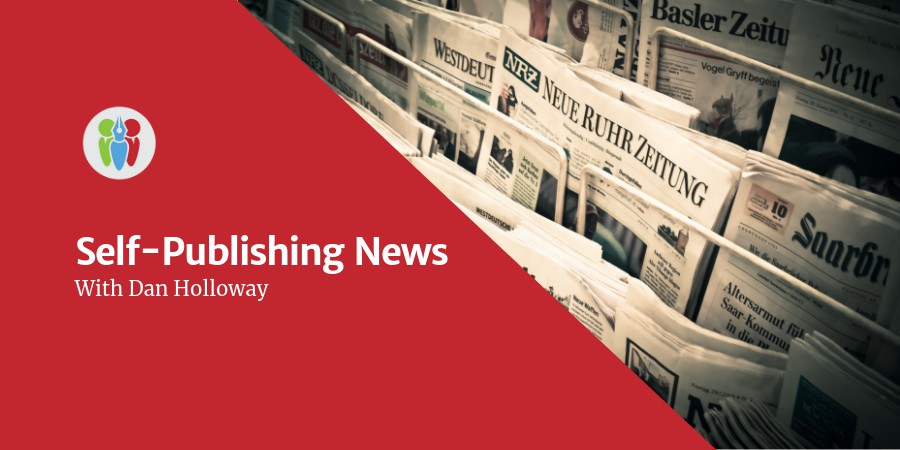
ALLi News Editor Dan Holloway
In this week's Self-Publishing News, ALLi News Editor Dan Holloway fills us in on the latest with a look at a new feature from Smashwords and some confusing figures about the sales of audiobooks.
This week sees a very rare occurrence in the UK – a Christmas general election. I won’t get political, but it is impossible to ignore one trend in recent elections. Storytelling matters more than ever before. Whether one believes we are living in a post fact age or not, we can’t ignore the increasing importance of narrative in the framing and reception of information. As writers, we are well and truly entering “our time”. Our special set of skills is more valuable, and more needed, now than ever.
Smashwords launches presales feature
Smashwords was the very first place I self-published, and I love reporting on new stories from them. This week, they have announced a new feature. Presales allows you to do just that. You can sell books before the publication date, for example at a cut price to your most dedicated followers. And Smashwords insist that presales on such a basis are entirely compatible with Kindle Select upon publication.
Reading by Subscription
Now we’re well into December, every story starts if not to jostle then at least gently nuzzle its way into the context of the year’s news. Our first three items all come from wider contexts that have elbowed their way into any year end round up. First up, we have the continued growth of subscription services.
Let’s start with Nextory, a relatively new name here. The subscription service has launched in Austria and Switzerland, bringing its total territories to 6. The platform offers ebook and audio subscription. Like its higher profile fellow digital platforms Storytel and Bookbeat, Nextory is based in Sweden.
It’s also been a busy week for two of the biggest names in the business. Wattpad have only just introduced paid subscription, but they have long been at the forefront of this kind of model of reading. And they are continuing their cross media work. Slow Dancing, by Noelle, has been a hit on the site to the tune of 9.5 million reads. It will become a TV series from Singapore’s Mediacorp.
An evergreen giant in the sector is Scribd. They have just received a $58million investment. The money will help them to scale from the recently-achieved 1 million subscriber mark.
A Different Library controversy
We've talked a lot about the ongoing battle between publishers and libraries. As I have reflected in my ALLi podcast chats with Howard, this makes me sad. Because libraries are magical places. The thought of even thinking about being on the other side of a dispute with libraries troubles me. This week's news illustrates one reason why. In the UK 800 libraries have closed this decade. That's wholesale devastation. And what it is doing to the future of reading doesn't bear thinking about. Libraries matter. We can talk about the fabulous opportunities they present to indies thanks to the likes of Overdrive. And that's true. But they matter full stop.
Audiobooks will do what?
Audio has been the hot topic of the year in publishing. For some time now audiobooks have shown strong double digit year on year growth. Meanwhile, ebook revenues have plateaued. But this week The Independent newspaper in the UK made a startling claim. Research, the paper claimed, showed that audiobooks would outstrip ebooks by 2020. The article cited fellow UK paper The Times. And everyone cited research by Deloitte. Nate Hofelder has done a good job of showing that the Independent article has misread the story covered in The Times.
But the original research from Deloitte is proving remarkably elusive. Nate points out that some of the figures appear to come from the UK Publishers’ Association report on 2018, where audiobook revenues are running at not much more than 10% of ebooks. This report on sales in the USA from earlier this year, however, does show audio revenues at 55% of ebooks. And on course to overtake them by 2021. If growth rates continue. All in all, it’s a confusing picture. But 2020 will provide us with answers!
A newspaper headline causes confusion over the sale of audiobooks, Smashwords issues a presales feature & other top #selfpub news stories for #indieauthors, in one quick read, by #ALLi News Editor Dan Holloway @agnieszkasshoes… Share on X
Over to You
What opportunities do you anticipate from the changing way in which people are reading? Let us know in the comments below.
Upcoming Conferences and Events
DECEMBER 2020
Authors' Book Fair, 14 Dec [Brighton]
FEBRUARY 2020
San Francisco Writers' Conference, 13-16 Feb [San Francisco]
MARCH 2020
London Book Fair, 10-12 Mar [London]
APRIL 2020
Self-publishing Conference, 25 Apr [University of Leicester]





Though I appreciate the publishers stats, I always look at them a little askance because the numbers reflect a bias publishers have had for the past decade as they continued to refuse to accept the digital books were viable and have done everything in their power to try to make them not viable –very high pricing, not dealing with libraries, and often making paperbacks less expensive than ebooks. The same holds for audiobooks, in that they frequently make those less expensive or the same price as ebooks.
The audiobook stat in the AAP article by Porter Anderson that stood out was: “it represented only 13.7 percent of online retail channels’ reported book content sales.” Though audiobooks may be increasing by double digits it is still a small part of the market in terms of overall sales. I think that indies, myself included, have been drawn in by the double digit rise and then disappointed that the sales are so small. My own audiobook sales are close to the same percentage as my paperback sales. About 10% of overall income. For me, the biggest reason for that is subscription services for audiobooks are where the vast majority of people get them and the payment from subscription services is significantly lower than direct sale.
Though I do distribute to description services for ebooks (outside of KU), my fanbase tends to still prefer to purchase ebooks directly from full price vendors or directly from me. I suspect it has to do with price points. With audiobooks running at a price point that is the same or exceeding paperbacks, consumers (at least in the U.S.) have decided that subscription is the best bargain. Where as with ebooks, the price points are still considered affordable. For my books that tends to be $3.99 or $4.99 for most of them.
I’d love to see some of these same stats from the indie book side. I suspect the balance would be closer to my results, 80% ebook, 10% paperback, and 10% audiobook.
I agree – and your experience of selling direct feels like it is something that is going to keep expanding, which is going to mean that getting centralised data becomes harder and harder – or rather that the data we have from outside becomes less and less relevant, and our own managed data is more and more imprtant